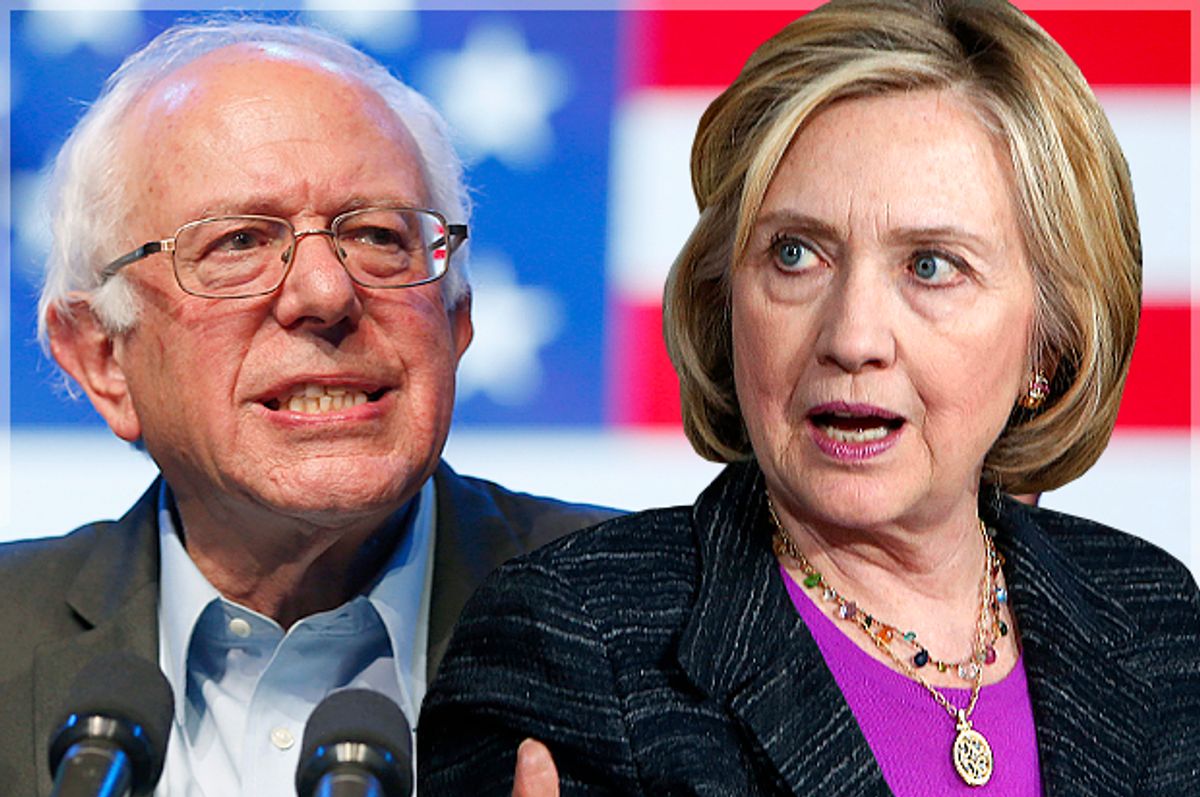Today at 2 p.m., Bernie Sanders gave a speech on Wall Street reform.
Yesterday, Hillary Clinton’s campaign preemptively attacked.
Her chief financial officer said of the then-undelivered speech that “Senator Sanders should go beyond his existing plans for reforming Wall Street and endorse Hillary Clinton’s tough, comprehensive proposals to rein in risky behavior within the shadow banking sector.”
This is bold, brash and wholly false.
The distinction between Sanders’ plan to break up the banks, and reining in shadow banking, is nonsensical, as “many so-called banks are in fact deeply involved in shadow banking activities.”
Clinton is the one “peddling soft reforms for shadow banks,” and refusing to break up the behemoth financial institutions.
Casting Sanders’ proposals as insufficient is “cheap” and “technically false,” as “no one seriously believes that [Sanders'] call to break up 'banks' would exclude massive insurance or investment houses.” That includes AIG and Lehman Brothers, two insurance/investment institutions Clinton often cites as cases where break-the-banks-up reform won’t work, when, in fact, “both AIG and Lehman also operated traditional banking units” and “Sanders' plan would have forced the companies to split up their activities.”
Clinton's other “tough" proposals include setting margin requirements on short-term borrowing, strengthening the Volcker Rule, expanding regulations on broker-dealers, taxing high-frequency trading, and changing how the Securities and Exchange Commission and Commodity Futures Trading Commission are funded.
In comprehensible English, that means Clinton is advocating minor tweaks to the financial regulation system, instead of its transformation.
As Mike Konczal, a fellow at the Roosevelt Institute, puts it, Clinton’s plan has “a lot of footnotes and wonky details,” whereas Bernie Sanders “wants to take on the power of the big banks.”
Running against a candidate with a hardline commitment to reducing the rich-and-powerful’s grip on prosperity and plenty has forced Clinton to attempt to distinguish herself by producing a lengthy, exhaustive set of specific policy proposals that “sure sound good,” but do not, in fact, go “beyond what currently exists.”
As Forbes reports, Clinton’s “proposals range from the arcane… to the silly,” as if “her heart isn’t up to the task progressives have set before her.”
And former U.S. Secretary of Labor and political economist Robert Reich notes that “Hillary Clinton’s proposals would only invite more dilution and finagle. The only way to contain the Street’s excesses is… [by] busting up the biggest banks.”
Clinton’s set of narrowly focused policies pale in comparison to Sanders’ overarching objective, but the many footnotes and “wonky details” give her platform the appearance of strength. With a plan ten times the length of Sanders’, Clinton is plainly and simply attempting to fool the American people with “a long list of 'regulatory enhancements.'”
In reality, Clinton does not have a “tough” plan for reigning in Wall Street, but “a laundry list of marginally better-than-nothing reforms that are likely to vanish into an abyss of rule-writing and regulatory dithering.”
This is not the first time Clinton has spoken one way to the public, and another behind closed doors.
In 2007, she publicly castigated the tax break for hedge-fund and private equity executives, even giving campaign speeches on the subject, yet “did not sign on as a supporter of a Senate bill that would have curbed the break.” Today, she continues to criticize the tax break she refused to battle against as a senator.
Clinton invites voters to “look at what I did in the Senate,” but, she actually only introduced five bills related to the dangerous housing bubble before/after the ’07 Crash. No committee took any action on them, and, in the Democrat-controlled Senate, “they died without further discussion.”
Hillary Clinton’s words do not reflect her actions.
There is a reason Clinton is receiving money from these financial giants, and in such amounts she feels compelled to lie about their relationship. She will not (and cannot) cut Wall Street’s stranglehold on the majority-generated wealth, in the vein of Theodore Roosevelt or FDR, and so is instead trying to sell minimal reforms as the crackdown that Sanders is championing.
In Wall Street’s own words, “Clinton would be one of the better candidates for financial firms.”
The Clinton campaign apparently thinks they can fool voters into believing her plan is “tough[er]” and more “comprehensive” by saying it over, and over, and over again.


Shares